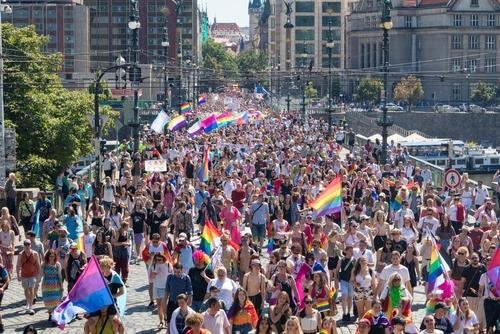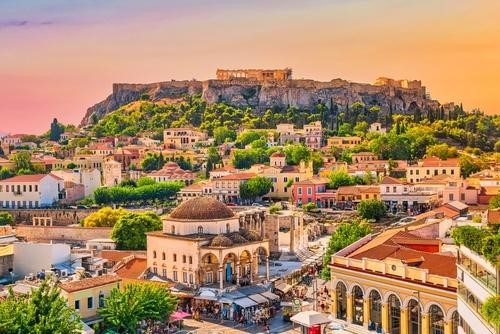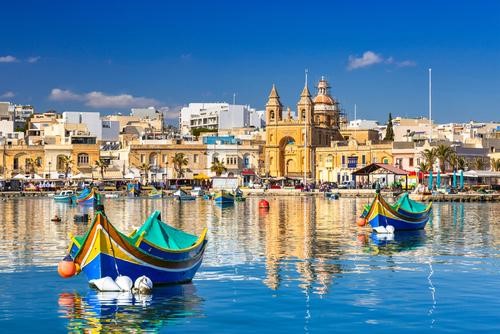From Switzerland to Spain, here are Europe’s most LGBTQ+ friendly countries.
Europe has long been seen as relatively progressive when it comes to LGBTQ+ rights, and thankfully it’s becoming even safer and more welcoming. But not all countries are equal – especially when it comes to policies and general level of acceptance – and some countries do a lot better than most. That’s why we’re unveiling the 20 most LGBTQ+ friendly countries in Europe in 2024. Each country has been carefully selected for its vibrant LGBTQ+ scene, progressive laws, and inclusive atmosphere. We’ve created our own points system using respected benchmarking tools, including the IGLA Rainbow Europe and Equaldex, and combined this with other factors, such as the number of queer-friendly bars, festivals and events, and legislation. So, without further ado, here are 20 countries in Europe where love knows no bounds.
20. Estonia

Points: 26/50
Estonia is the most LGBT-friendly country in the Baltic and has risen in the ranks to become one of Europe’s top 20 LGBT-friendly countries in the past five years. It was the first Baltic country to introduce marriage equality, making it possible for same-sex couples to get married and adopt. The government has since introduced other pioneering initiatives, like the Gender Recognition Act of 2014 which allows individuals to change legal gender without medical intervention. Beyond legislation, Estonia boasts a small but burgeoning LGBTQ+ scene, particularly in Tallinn. Iconic venues like X-Baar and gay sauna Club 69 are on the rise, plus the city has hosted a Pride festival since 2017.
19. Czech Republic

Editorial credit: tonydanilov / Shutterstock.com
Points: 28/50
The Czech Republic might not be the first country to spring to mind when it comes to an LGBTQ+ scene, but it should be up there. The country’s attitude is surprisingly progressive, particularly when it comes to LGBTQ+ rights. Same-sex registered partnerships have been legal since 2009 and adoption rights for same-sex couples were established over a decade ago. Prague is home to the annual Prague Pride, which draws in at least 90,000 revellers every year, as well as other popular festivals like the long-running Mezipatra Queer Film Festival and a string of LGBTQ+ bars and nightclubs, like The Saints and Club Termix. However, outside of the major cities and in more rural areas discrimination and harassment persists, which accounts for its low IGLA rating of 25.7%.
18. Switzerland

Points: 30/50
Switzerland boasts a vibrant LGBTQ+ community, particularly in major cities like Zurich and Geneva, as well as Basel, Bern, and Lucerne. It might be a small country, but Zurich and Geneva both boast more gay bars than better-known LGBTQ+ scenes like Copenhagen and Oslo. The annual Zurich Pride Parade is smaller than most at around 35,000 attendees, but there’s a whole host of other Pride celebrations to choose from across the country in Geneva, Bern, and Lucerne. However, while Switzerland ranks highly with an Equaldex ranking of 68, it loses IGLA points due to ongoing challenges around hate crime and non-discrimination legislation. That said, strides are being made: same-sex marriage was legalised in 2022 and The National Council recently agreed with a motion to ban employment discrimination based on sexual orientation and gender identity.
17. Luxembourg

Points: 32/50
What Luxembourg lacks in size, it more than makes up for in LGBT+ friendliness. It is quietly but confidently asserting itself as a leader in LGBTQ+ rights, with landmark legislation such as the 2015 legalisation of same-sex marriage and robust anti-discrimination laws. In fact, the country’s own Prime Minister Xavier Bettel married his same-sex partner in 2015. It may not have a reputation as a party town in the LGBTQ+ community, but it is niche and thriving, particularly in the capital. There are dozens of LGBTQ+ friendly bars in the country, though officially only three gay bars, including the ever-popular Letz Boys. The annual Pride Festival is small but popular and runs for an entire weekend in July. Plus, there are dozens of LGBTQ associations and initiatives, like the Rosa Letzebuerg Association, which explains its high IGLA (68.3%) and Equaldex (79) scores.
16. Ireland

Points: 34/50
The Emerald Isle has long since cemented its position as one of Europe’s most LGBTQ+ friendly destinations thanks to its progressive and inclusive attitude. It was the first country in the world to legalize same-sex marriage by popular vote and has since built on this victory with other progressive laws, such as the Gender Recognition Act of 2015. But it’s not just about legislation; Ireland’s LGBTQ+ community thrives in its colourful pubs and lively festivals. Dublin is home to at least seven iconic LGBTQ+ bars and hosts the annual Dublin Pride Parade festival, as well as a string of other festivals across the country like the Dublin Gay Theatre Festival, GAZE LGBY International Film Festival and Galway Pride.
15. Greece

Points: 34/50
While historically conservative, Greece has undergone a transformative journey towards inclusivity in recent years, solidifying its status as one of Europe's most LGBT-friendly countries. In 2015, Greece passed legislation allowing same-sex couples to enter civil unions, granting them the same legal recognition and rights as heterosexual partnerships. Greece now boasts anti-discrimination laws that protect individuals based on sexual orientation and gender identity too, which explains why its IGLA score has jumped to 57.69%. Athens, the vibrant capital, is now a bustling hub of LGBT-friendly establishments, from lively bars to inclusive clubs. The annual Athens Pride parade draws crowds from far and wide too.
14. Sweden

Points: 36/40
Sweden has long been a trailblazer in advancing LGBT rights: it decriminalised LGBTQ+ identity more than 75 years ago, legalised same-sex marriage and granted couples the right to adopt children in 2009. The government also boasts comprehensive anti-discrimination laws that protect individuals based on sexual orientation and gender identity, ensuring that everyone is treated with dignity and respect. Stockholm has a renowned LGBTQ+ scene, with a good number of LGBTQ+-owned bars, clubs and events, including Moxy (Scandinavia’s largest queer women’s club) and the iconic Secret Garden. Stockholm Pride, while relatively small, is an important date in the calendar too.
13. Malta

Points: 38
This rainbow haven in the Mediterranean is one of the most LGBT-friendly countries in Europe for very good reason. It has an IGLA ranking of 90.29% – the highest of any European country – due to its robust anti-discrimination policies and initiatives, such as the Ministry of Education’s new policy to make schools more inclusive to trans, gender variant and intersex children. Malta made history in 2017 by becoming the first European country to ban conversion therapy and same-sex marriage has been legal for nearly 10 years. Despite Valetta’s teensy-tiny size, the annual Pride festival attracts at least 38,000 attendees every year too.
12. Portugal

Points: 40
Portugal is one of Europe’s most progressive and inclusive countries, thanks to its progressive policies and vibrant LGBT community. In 2010, it became the eighth country in the world to legalize same-sex marriage and since then the government has enacted comprehensive anti-discrimination laws, including legal recognition of same-sex couples in areas such as adoption. The capital hosts an annual Pride festival and the country ranks highly for LGBTQ+ lifestyle thanks to its diverse array of bars, clubs and cultural events. In Lisbon, the Bairro Alto and Príncipe Real districts are LGBTQ+ hotspots, while iconic venues like Trumps and Lux Frágil are renowned. Cities like Porto and Faro also have a thriving LGBT scene.
11. Iceland

Points: 40/50
Iceland is a progressive paradise nestled in the heart of Europe. The government legalised same-sex marriage back in 2010 and introduced a string of progressive policies, with comprehensive anti-discrimination laws safeguarding individuals based on sexual orientation and gender identity. Reykavik hosts a huge annual Pride festival, which draws thousands of revellers every year. Plus, the education system takes proactive steps to promote LGBTQ+ awareness and inclusivity. Iceland is breaking barriers when it comes to politics too; Jóhanna Sigurðardóttir made history as the world's first openly gay head of government when she ascended to the role of Prime Minister in 2009, paving the way for greater LGBTQ+ representation on the global stage. Iceland has an IGLA rating of 70.62% and an Equaldex rating of 92, which is higher than some of the top entries on our list too. However, when it comes to nightlife it has a slightly lower-than-average number of dedicated LGBTQ+ bars.
10. Finland

Points: 40/50
Finland isn’t just the happiest country in the world, it’s also one of the most inclusive. It scores high on both the IGLA index (70.62%) and Equaldex (79%) thanks to progressive legislation, such as a long history of same-sex marriage and more recent laws defending transgender rights. Helsinki Pride, one of Europe's largest Pride events, unites thousands every year. The prime minister even attended the celebrations last year. Smaller cities like Turku and Tampere host their own Pride festivities and there are a whopping 40 Pride celebrations across the country. Iconic LGBTQ+ venues like Helsinki's legendary Cafe Cavalier and the Bear Park Cafe in Turku offer safe and inclusive spaces for socialising and self-expression. Queer-friendly bars are on the rise too, especially in the Meatpacking District in Helsinki. For travellers, LGBTQIA+ tour operators like Aurora make it even easier to travel too.
9. Denmark

Editorial credit: ActionPix / Shutterstock.com
Points: 40/50
Renowned for being one of the most progressive countries in Europe, Denmark boasts an impressive IGLA rating of 76.54%, surpassing even stalwart nations such as France, Germany, and the Netherlands. With an Equaldex score of 87, it's clear that Denmark is not just a trendsetter but a trailblazer of inequality. The country proudly embraces its vibrant ‘rainbow families’ (families with two mothers or two fathers), which have doubled between 2009 and 2019, a testament to its unwavering support for diverse family structures. Copenhagen, hailed as the LGBTQ+ neighbourhood of Scandinavia by LGBT awards, boasts a busy calendar of Pride celebrations and events like Pride Week, MIX Copenhagen LGBTQ Film Festival, and Winter Pride. Areas like Studiestraedet are hubs for LGBTQ+ nightlife too, with a vibrant array of bars and nightclubs, including the iconic Centralhjornet, the oldest gay bar in the world. Beyond the capital, there are celebrations of diversity in Aarhus, Fano, Aalborg, and Odense.
8. Belgium

Points: 40/50
Belgium regularly ranks as one of the most progressive countries in Europe when it comes to LGBT+ rights. According to the IGLA, Belgium holds the second position in the EU based on how its laws and policies of the country impact the lives of LGBTQ+ individuals. In 2023, Belgium celebrated the 20th anniversary of legalising same-sex marriage, showcasing its commitment to equality. The country is renowned for being a safe and inclusive environment for travellers too. Big cities like Brussels, Antwerp and Liege boast a well-established and thriving queer culture with well-known destinations like the Rainbow House. Brussels hosts a whole week of Pride celebrations, including debates, activities and a Pride march, in May too. In tribute to LGBTQ+ activism, a new bridge in Brussels will bear the name of Suzan Daniel, a pioneering figure who founded Belgium's first LGBT association.
7. Austria

Points: 40
When it comes to legislation, Austria was one of Europe’s first adopters of same-sex marriage (it’s been legal since 2006) and in 2019 the country legalised marriage equality, cementing its commitment to inclusivity. Austria’s colourful capital hosts one of Europe’s largest Pride festivals too, attracting thousands of attendees every year. Beyond events, Austria boasts more LGBT-friendly bars and nightlife than most of Europe’s capital cities. In terms of travel, the tourism board actively promotes LGBT-friendly accommodations and experiences, plus the government’s funding of initiatives and support for LGBT organizations speaks volumes about its commitment to inclusivity. Austria has a lower IGLA rating compared with other top entries due to its lack of public policies tackling gender identity hatred and hate crime, though Equaldex has given it a score of 75 due to public perceptions towards the LGBT community.
6. Norway

Points: 42
Norway has long been celebrated worldwide for its progressive policies and commitment to equality. The government has enacted robust anti-discrimination laws safeguarding LGBTQ rights, including the legalization of same-sex marriage in 2008 and the decriminalization of homosexuality in 1981, as well as proactive educational initiatives like inclusive sex education in schools and awareness campaigns challenging prejudice and stereotypes. Cities like Oslo and Bergen host huge Pride festivals that draw massive international crowds too. It was one of the first countries in the world to include sexual orientation in its discrimination law, proving that LGBTQ rights are enshrined not just in law but embedded in the fabric of society. Norway ranks as 68.42% IGLA rating and one of the highest Equaldex rankings on our list, with a score of 89.
5. Netherlands

Points: 42/50
The Netherlands has really earned its stripes as the fifth most LGBTQ+ friendly country in Europe thanks to its progressive policies and inclusive culture. It’s a haven for the LGBTQ+ community and the country’s commitment to LGBTQ rights is entrenched, with openly LGBTQ politicians and leaders across sectors who advocate for inclusivity and diversity. It was also the first country in the world to legalize same-sex marriage in 2001, setting a precedent for LGBTQ rights globally. Most of the LGBTQ+ centres around major cities like Amsterdam, Rotterdam and Utrecht, which host iconic events such as the Amsterdam Pride Parade and the International Queer and Migrant Film Festival. The Netherlands has an impressive IGLA rating of 56.99% and one of the highest Equaldex rankings on the list at 82.
4. Germany

Points: 42/50
When it comes to LGBTQ+ friendliness in Europe, Germany comes up trumps thanks to its progressive laws, robust representation and vibrant cultural scene. It’s achieved an IGLA ranking of 64.3% and an Equaldex rating of 77 due to comprehensive anti-discrimination laws that protect LGBTQ individuals in most aspects of life. The country’s legal framework champions equality, with same-sex marriage legalised in 2018 and full rights and recognition granted to LGBTQ couples too. Berlin hosts one of Europe’s largest Pride events, Christopher Street Day, and other cities like Cologne and Hamburg also host Pride festivals. There are dozens of LGBT-friendly districts sprinkled across the country, from Berlin's Schöneberg to Cologne's Bermuda Triangle.
3. France

Editorial credit: Julien Jean Zayatz / Shutterstock.com
Points: 42/50
With its rich cultural heritage and progressive legislation, France is a shining example of LGBTQ+ rights on the continent. Same-sex marriage has been legal since 2013 and the country’s stringent anti-discrimination laws protecting individuals when it comes to family, civil space and hate crime have earned it an IGLA rating of 64.3% and an Equaldex rating of 77. Big cities like Paris and Lyon boast vibrant LGBTQ+ communities with a high number of queer-friendly establishments and some of the best Pride events in the continent, demonstrating the country’s commitment to love and inclusivity.
2. UK

Editorial credit: BBA Photography / Shutterstock.com
Points: 44/50
The UK is one of the most culturally liberal and inclusive countries for LGBTQ+ individuals. In the past two decades, societal attitudes have evolved with widespread support for the LGBTQ+ community and there is increasing visibility of representation in various aspects of British culture. Major cities like Brighton, London and Manchester are well known for their thriving LGBTQ scenes with diverse nightlife, events and organisations. In fact, London has more gay bars than any other city in Europe. Plus, the Pride celebrations are some of the most popular on the continent; more than 1.5 million people attended last year’s Pride celebrations in London. The IGLA has ranked it 53.9% and it has an Equaldex ranking of 74 due to its robust anti-discrimination laws and protections for LGBTQ+ individuals in employment, housing and healthcare.
1. Spain

Points: 46/50
This sunny Southern European country has rightly earned its reputation as the most LGBTQ+ country in Europe – it radiates warmth, and not just when it comes to the weather. With an IGLA ranking of 74.6% and an Equaldex ranking of 74, it boasts some of the most comprehensive anti-discrimination laws on the continent. It was one of the first countries in Europe to introduce same-sex marriage back in 2005 and since then the government has bolstered its commitment to the LGBTQ+ cause with legislation like the ‘Trans Law’, which allows gender recognition based on self-identification. Spain is home to some of the most popular LGBTQ celebrations on the continent and Madrid’s annual Pride event attracts over 2,000,000 every year. Many of the country’s biggest cities have vibrant LGBTQ+ neighbourhoods, like Chueca in Madrid, with an abundance of gay bars and nightlife.